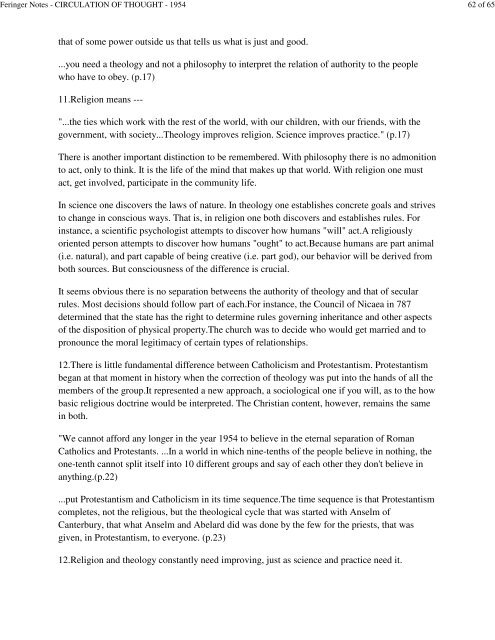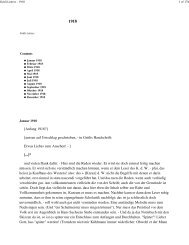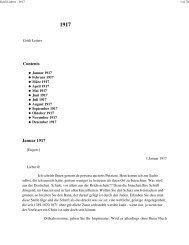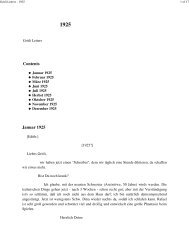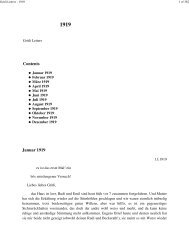Download pdf file - Eugen Rosenstock-Huessy
Download pdf file - Eugen Rosenstock-Huessy
Download pdf file - Eugen Rosenstock-Huessy
You also want an ePaper? Increase the reach of your titles
YUMPU automatically turns print PDFs into web optimized ePapers that Google loves.
Feringer Notes - CIRCULATION OF THOUGHT - 1954 62 of 65<br />
that of some power outside us that tells us what is just and good.<br />
...you need a theology and not a philosophy to interpret the relation of authority to the people<br />
who have to obey. (p.17)<br />
11.Religion means ---<br />
"...the ties which work with the rest of the world, with our children, with our friends, with the<br />
government, with society...Theology improves religion. Science improves practice." (p.17)<br />
There is another important distinction to be remembered. With philosophy there is no admonition<br />
to act, only to think. It is the life of the mind that makes up that world. With religion one must<br />
act, get involved, participate in the community life.<br />
In science one discovers the laws of nature. In theology one establishes concrete goals and strives<br />
to change in conscious ways. That is, in religion one both discovers and establishes rules. For<br />
instance, a scientific psychologist attempts to discover how humans "will" act.A religiously<br />
oriented person attempts to discover how humans "ought" to act.Because humans are part animal<br />
(i.e. natural), and part capable of being creative (i.e. part god), our behavior will be derived from<br />
both sources. But consciousness of the difference is crucial.<br />
It seems obvious there is no separation betweens the authority of theology and that of secular<br />
rules. Most decisions should follow part of each.For instance, the Council of Nicaea in 787<br />
determined that the state has the right to determine rules governing inheritance and other aspects<br />
of the disposition of physical property.The church was to decide who would get married and to<br />
pronounce the moral legitimacy of certain types of relationships.<br />
12.There is little fundamental difference between Catholicism and Protestantism. Protestantism<br />
began at that moment in history when the correction of theology was put into the hands of all the<br />
members of the group.It represented a new approach, a sociological one if you will, as to the how<br />
basic religious doctrine would be interpreted. The Christian content, however, remains the same<br />
in both.<br />
"We cannot afford any longer in the year 1954 to believe in the eternal separation of Roman<br />
Catholics and Protestants. ...In a world in which nine-tenths of the people believe in nothing, the<br />
one-tenth cannot split itself into 10 different groups and say of each other they don't believe in<br />
anything.(p.22)<br />
...put Protestantism and Catholicism in its time sequence.The time sequence is that Protestantism<br />
completes, not the religious, but the theological cycle that was started with Anselm of<br />
Canterbury, that what Anselm and Abelard did was done by the few for the priests, that was<br />
given, in Protestantism, to everyone. (p.23)<br />
12.Religion and theology constantly need improving, just as science and practice need it.


